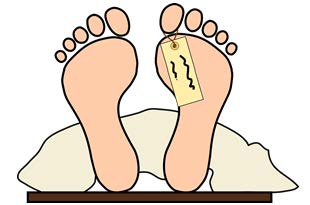More of us will die of a stress-related condition than from infection or old age.1
A young lady confidently walked around the room with a raised  glass
glass
of water while explaining stress management to an audience.
Everybody expected her to ask, ‘half empty or half full?’ Instead, she asked, “How heavy is this glass of water?” Answers called out ranged from 8 oz. to 20 oz.
“The weight doesn’t matter, she said. What matters is how long I hold it. If I hold it for a minute, no problem. If I hold it for an hour, my arm will ache. If I hold it for a day, I’ll need an ambulance. In each case, it’s the same weight, but the longer I hold it, the heavier it becomes.” She continued, “…and that’s the way it is with stress. If we carry our burdens all the time, sooner or later, as the burden becomes heavier, we won’t be able to carry on.”
Waking up tired, emotionally drained, carrying excessive abdominal fat are just a few signs that you are holding onto stress (the glass of water), and have reached the stage of being chronically (and dangerously) stressed.2
Only ten months after starting my first outside sales position in an industry I knew little about, my boss was killed in an automobile accident.
Two weeks after her funeral, I was promoted to her position, which meant managing people, sales, and a multi-million dollar budget. As the company CEO handed me the first budget I had ever seen, he said, “This will put hair on your chest”. That was not on my “bucket list”, but I accepted the challenge.
Four months later, I got married.
Six months after my wedding, I lost my mother to cancer. She was only 64.
Stress finally brought me to my knees. Emotionally, I was spent. Physically, I was walking dead.
According to the Holmes and Rahe Stress Scale, a test that ranks stressors on a scale of least stressful to most stressful with the idea the more stressful the event, the higher the likelihood of illness, I should have been dead! I was 77 points over the highest ranking for developing a major illness! (Source: http://www.stress.org/holmes-rahe-stress-inventory/)
I suspect if we randomly gave the Holmes and Rahe Stress Scale test to any worker today, they’d also rank way above a healthy level since 83% of workers say they’re stressed at work. Americans are working longer hours than ever before. Sixty percent use their cell phones to check in with work outside of normal working hours.2
My husband used to work in such a toxic environment, he and his colleagues felt compelled to work longer and longer hours, fearing if they were the first to leave each day, they’d look less committed and easily replaced. The pressure was overwhelming. Shockingly, only one of the men in his department suffered a heart attack!
Unfortunately, his former company is more the norm than the exception of what’s happening in our workplaces. This is alarming!
Human DNA has only changed 0.1% in the last 10,000 years.3 In contrast; the technological revolution we’re enjoying has made the change in our world mind-bending. We simply aren’t genetically adapted to the circumstances we encounter in our lives today.
Although we’re no longer chased by saber-toothed tigers, we live in a time that places demands on us in a way that our bodies think we’re still being chased by saber-toothed tigers. Our genetics don’t understand today’s stressors and haven’t caught up with our modern “tigers”.
I heard a speaker once say, “You don’t get ulcers because of what you’re eating. You get ulcers because of what’s eating you”! My stressors were on a feeding frenzy.
I used to work with a fellow that broke out in hives when he was stressed. Another would walk down the hallway, red-faced, banging his fist against the wall with every step, screaming at the top of his lungs and causing general disruption throughout the office. Still another, who sat in close proximity to me, would signal distress with uncontrollable (and highly audible) belching.
As a biofeedback coach once pointed out to me, the word “disease” simply means “dis-ease” or the absence of ease (calm) within the body. Is this state of un-ease becoming the new normal?
If you’re a manager, you’re in a position to ease the day-to-day stressors your employees experience by minimizing:
- overtime, working through breaks or taking work home
- lack of support by supervisors, managers and/or co-workers
- a sense of job insecurity
- lack of role clarity and expectations
- lack of communication
- conflict among colleagues or managers
- after-hours communications
Some of the obvious advantages to eliminating stressors in the workplace are happier and more productive employees and less turnover.
If you’re a contract employee constantly adapting to new environments and people, make the decision to accept the initial stress of starting a new job. Since contract work is a conscious choice, view the initial stress as a positive to enjoying varied experiences.
Minimize stress by …
- Gaining clarity of what’s expected of you
- Arriving on time
- Coming prepared to do the job
- Communicating with co-workers and supervisors
- Avoiding conflict with others
- Listening and following instructions
- Avoiding unnecessary “noise”. (i.e., constantly checking emails and phone messages, spending hours on social media looking at what other people do).
Stress is a fact of life. But you can become less stressed if you remember that in order to take care of others; your oxygen mask goes on first!
By Linda Zumstein
1(Source: https://www.linkedin.com/pulse/stress-workplace-silent-killer-dr-rose-aghdami)
2(Source: https://www.huffingtonpost.com/entry/american-workplace-broken-stress_us_566b3152e4b011b83a6b42bd)
3(Source: https://www.healthcoachfx.com/stress-body-mind-solutions/)
